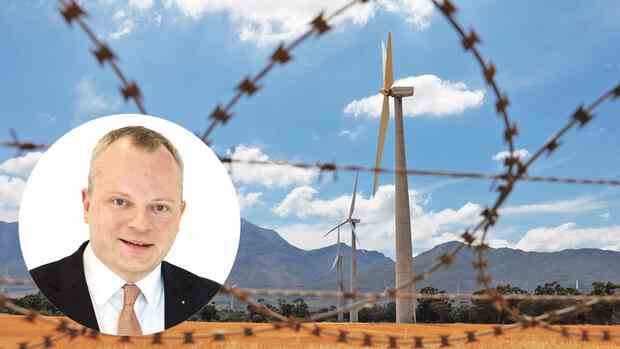Stefan Liebing is managing director of the consulting company Conjuncta and honorary professor at the Flensburg University of Applied Sciences.
When Federal Economics Minister Robert Habeck opens the “German-African Business Summit” in South Africa on Wednesday, the solution to some of the current crises could be within reach.
Africa offers a lot that Europe urgently needs: raw material deposits with which we could reduce one-sided dependence on China, as well as cheap green energy for climate-friendly electrification of African economies. This prevents additional CO2 emissions that would otherwise be unavoidable due to local economic and population growth. In addition, the continent has huge opportunities to deliver solar and wind power to Europe in the form of hydrogen, thereby reducing dependence on Russian gas.
Above all, however, our southern neighbor is a suitable location for the development of alternative value chains and thus for industrial diversification, which has become so important for German companies after Corona.
Medium-sized companies reduce their China risk with production in North Africa
Many raw materials are mainly found in West and Central Africa. Green hydrogen could come from the sunny and windy region of southern Africa. North Africa, on the other hand, offers German industry the opportunity to procure primary products or to process them further on site.
Top jobs of the day
Find the best jobs now and
be notified by email.
Morocco, Tunisia, Algeria and Egypt have comparatively well-trained staff, low labor costs and, in many cases, a good infrastructure. Ports are well developed and enable fast connections to Europe – at significantly lower logistics costs than China, for example.
The continent offers many opportunities for generating climate-friendly energy.
(Photo: Reuters)
The power supply is reliable, currencies are stable. Largely unnoticed by the public, a number of German companies have already taken advantage of this. More than 280 German companies have branches and production facilities in Tunisia, and 300 in Egypt. Free trade zones such as “Tanger Med” in Morocco attract scores of European medium-sized companies that no longer want to rely exclusively on China.
Friedemann Faerber, Managing Director of the automotive supplier SCS, wrote to me: “We will successively relocate products that we had previously produced in China to Morocco. Drivers for this are, on the one hand, the favorable production conditions in Morocco and, on the other hand, the significant price increase in logistics. Of course, we are also concerned about the country risk of China. A lot has become unpredictable for us.”
Other medium-sized German companies are also settling in the region, such as the car supplier Prettl Group or the electronics manufacturer Kostal. Especially with simpler and labour-intensive production processes, it would be too expensive to bring plants back to Europe as a result of the crises.
On the other hand, building several parallel value chains and thus diversifying default risks is an attractive option for many companies in the supply industry, textiles or mechanical engineering sectors.
So far there has been a lack of venture capital, security and guarantees for investments in Africa
However, the main obstacle for many SMEs is financing. Banks often find it difficult to objectively assess country risks in Africa. Many do not have sufficient local experience.
>> Read here: How China exploits the Congo’s natural resources – and why Europe hesitates
Political risks are easily insurable and the economic conditions are often better than expected even after the corona crisis. However, the planned tightening of banking regulation (“Basel IV”) would make it even more difficult and, above all, more expensive to mobilize outside capital, which is necessary for the politically desired diversification of the German economy.
There are also hurdles for commercial transactions, such as the delivery of new machines to African plants: Hermes guarantees are often too expensive or have a high deductible. It is therefore good if German business meets African partners in South Africa on Wednesday and the Federal Government accompanies the conference at a high level.
However, in order for Africa to ensure that Germany’s strong dependence on China is reduced, homework must be done, especially in Berlin.
German medium-sized companies can make a significant contribution to the development of the African continent through investments and the creation of jobs. But he needs risk capital, insurance and guarantees.
And that means nothing less than a new approach to foreign trade and development policy. The “turning point” would be the right time to tackle this with determination.
The author:
Stefan Liebing is managing director of the consulting company Conjuncta and honorary professor at the Flensburg University of Applied Sciences.
More: “We have to listen to each other” – Federal government wants to revise Africa strategy again.
